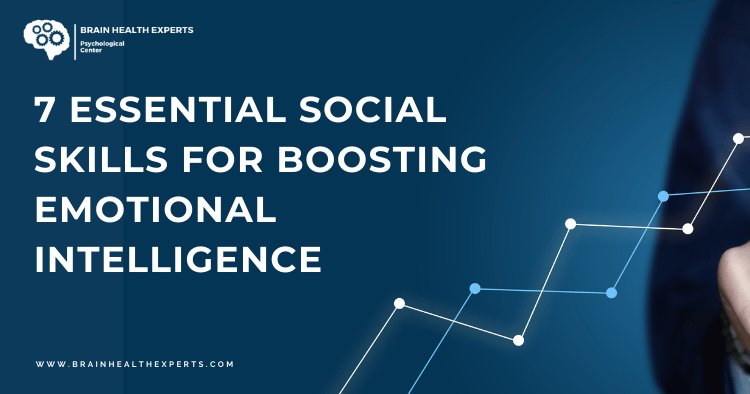Table of Contents
- Understanding Emotional Intelligence
- Active Listening
- Empathy
- Nonverbal Communication
- Conflict Resolution
- Effective Feedback
- Networking Skills
Understanding Emotional Intelligence
Emotional intelligence (EQ) is the ability to recognize, understand, and manage our own emotions while also recognizing, understanding, and influencing the emotions of others. It plays a crucial role in our interpersonal interactions, decision-making, and overall mental well-being.
Recent studies have shown that individuals with high emotional intelligence can build stronger relationships and navigate social complexities more effectively. In 2024 and beyond, the emphasis on EQ in personal and professional development continues to grow, reflecting its importance in diverse settings.
To enhance your emotional intelligence, developing essential social skills is key. Below, we’ll explore seven social skills that can help you boost your EQ.
1. Active Listening
Active listening is about more than just hearing words; it involves fully engaging with the speaker, showing genuine interest, and providing thoughtful responses. This skill is vital for building rapport and trust in any relationship.
Tips for Active Listening
- Give Full Attention: Put away distractions and focus solely on the speaker.
- Use Verbal and Nonverbal Cues: Nod, make eye contact, and use affirmations like “I see” or “Go on.”
- Reflect Back: Summarize what the speaker said to ensure understanding.
“Listening is not just about waiting for your turn to speak.”
FAQ
Q: How can I practice active listening?
A: Start by consciously focusing on conversations and summarizing what you hear. You can also join groups where dialogues are encouraged, like book clubs or discussion groups.
For more techniques on how positive thinking can enhance active listening, check out 10 Positive Thinking Techniques to Reduce Stress.
2. Empathy
Empathy is the ability to understand and share the feelings of others. By practicing empathy, you can enhance your relationships and foster a supportive environment.
Ways to Cultivate Empathy
- Put Yourself in Others’ Shoes: Try to view situations from the perspective of others.
- Ask Open-Ended Questions: Encourage others to express their feelings and thoughts.
- Validate Feelings: Acknowledge the emotions of others, even if you don’t necessarily agree with them.
“Empathy is about finding echoes of another person in yourself.”
FAQ
Q: What if I struggle to empathize with others?
A: Start small by practicing empathy with people you feel comfortable with. Gradually expand to others by being curious about their experiences.
Consider exploring 10 Ways Positive Thinking Transforms Your Relationships for more insights.
3. Nonverbal Communication
Body language, facial expressions, and tone of voice all play a crucial role in how we communicate. Understanding nonverbal cues can significantly enhance your emotional intelligence.
Key Elements of Nonverbal Communication
| Element | Description |
|---|---|
| Facial Expressions | Convey emotions and reactions. |
| Posture | Indicates confidence and openness. |
| Eye Contact | Builds trust and engagement. |
| Gestures | Reinforces verbal communication. |
“The most important thing in communication is hearing what isn’t said.”
FAQ
Q: How can I improve my nonverbal communication skills?
A: Practice in front of a mirror or record yourself speaking. Pay attention to your body language and make adjustments as needed.
You can also learn more about the importance of emotional intelligence in your daily life through 10 Effective Emotional Regulation Techniques for Daily Life.
4. Conflict Resolution
Conflict is a natural part of any relationship. The ability to manage and resolve conflicts effectively is crucial for maintaining healthy interactions.
Steps to Resolve Conflict
- Stay Calm: Keep emotions in check to avoid escalating the situation.
- Listen Actively: Understand the other person’s perspective.
- Find Common Ground: Identify shared goals or values to foster collaboration.
- Seek Solutions: Work together to find mutually agreeable resolutions.
“In the middle of difficulty lies opportunity.”
FAQ
Q: What if the conflict escalates?
A: If emotions run high, it may be helpful to take a break and revisit the discussion later when everyone is calmer.
Enhance your skills further with 10 Proven Stress Management Techniques for Daily Relief.
5. Effective Feedback
Providing and receiving feedback is essential for personal and professional growth. Mastering this skill can greatly enhance your emotional intelligence.
Guidelines for Giving Feedback
- Be Specific: Focus on particular behaviors rather than generalizations.
- Use “I” Statements: Share how the behavior impacts you.
- Encourage Dialogue: Allow the other person to share their perspective.
“Feedback is the breakfast of champions.”
FAQ
Q: How can I receive feedback gracefully?
A: Approach feedback as an opportunity for growth. Avoid defensiveness and ask clarifying questions if needed.
To improve your feedback skills, consider reading 10 Tips to Overcome Negative Thought Patterns Today.
6. Networking Skills
Building a strong network can enhance your emotional intelligence by exposing you to diverse perspectives and ideas. Networking is not just about professional connections; it encompasses building meaningful relationships.
Strategies for Effective Networking
- Be Genuine: Approach others with authenticity and interest.
- Follow Up: Keep the connection alive by reaching out after meeting someone.
- Attend Social Events: Engage in activities where you can meet new people.
“Your network is your net worth.”
FAQ
Q: How can I overcome networking anxiety?
A: Prepare a few conversation starters and practice them. Remember, most people appreciate a friendly approach!
Explore Top 5 Positive Thinking Workshops to Transform Mindset for networking opportunities.
7. Emotional Regulation
Lastly, being aware of and managing your emotions is essential for emotional intelligence. Emotional regulation helps you respond to situations thoughtfully rather than react impulsively.
Techniques for Emotional Regulation
- Mindfulness Practices: Engage in meditation or breathing exercises to center yourself.
- Keep a Journal: Reflect on your emotions and triggers to understand them better.
- Seek Support: Don’t hesitate to reach out to friends or professionals when needed.
“It’s not the load that breaks you down, it’s the way you carry it.”
FAQ
Q: Can emotional regulation be learned?
A: Yes! With practice and patience, anyone can develop emotional regulation skills.
For more on emotional regulation, check out 10 Groundbreaking Studies on the Power of Positive Thinking.
Conclusion
Enhancing your emotional intelligence is a journey that requires commitment and practice. By focusing on these seven essential social skills—active listening, empathy, nonverbal communication, conflict resolution, effective feedback, networking skills, and emotional regulation—you’ll not only improve your EQ but also enrich your personal and professional relationships.
“The more you invest in developing these skills, the more fulfilling your relationships will become.”
For further reading on emotional intelligence, check out the Harvard Business Review here.
Happy learning!





